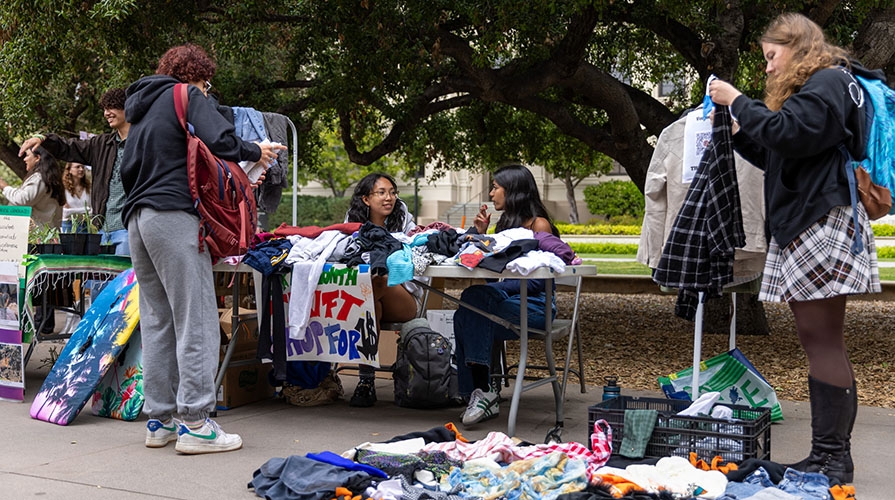
When it comes to waste, mindful practices and a collaborative spirit define the scene at Oxy.
We interact with waste every day. Whether it be a candy wrapper or some grapes forgotten at the back of the fridge, knowing how to responsibly dispose of our waste can make a huge difference in our campus carbon footprint. Reducing, reusing, and recycling are pinnacles of Oxy's waste management strategy, but it takes all of us to participate!
Reusable To Go Box Program
In the Fall of 2023, Oxy's largest dining hall adopted an all-reusable takeout box program. All meals taken to go at the Marketplace are served in reusable, dishwasher-safe, and microwavable "eco-clamshells," which must be checked out using the ReusePass program.
Program Impact (2023-24):
- 55,000 single-use containers saved from landfill
- 5,400 lbs of waste diverted
- 35,500 gallons of water saved
How to Participate:
- Sign up for ReusePass before you plan to take food to go from the Marketplace. Go to app.reusepass.com/oxy and follow the prompts to create your account.
- Check out your eco-clamshell by having your ReusePass QR code ready at checkout! The dining staff team will scan your QR code and the container QR code when you check out at the Marketplace. This completes the check-out process, and you'll see the eco-clamshell in your ReusePass account. (Pro-Tip! Add your ReusePass QR code to your mobile wallet or take a screenshot for easy access!)
- Enjoy your meal waste-free and then return the container to the tray drop within 72 hours. Once a container is checked out, it must be returned within 72 hours, or you will incur a late fee.
Learn more on the Campus Dining Sustainability page, or email dining@oxy.edu with any questions!
Bring Your Own & For-Here Mugs
The Marketplace, Tiger Cooler, and student-run Green Bean Cafe all allow customers to bring their own mug or cup for drinks! The Green Bean also offers a "for here" mug program in an effort to reduce waste.
Move Out Donation Drive
Green Move Out is a collaborative effort of the Office of Sustainability, Residential Education and Housing Services (REHS), and Facilities Management to divert as much of these items as possible from landfill and circulate them back into the local community.
Beginning the day after classes end in the spring, students may donate acceptable items to the Donation Stations located in each residence hall by sorting them into the appropriate donation bin! This helps to keep the bins from overflowing, and helps Green Move Out volunteers direct the donated goods to the right recipient, including our on-campus Oxy Ecossentials Club, which hosts an annual Fall Move-In Thrift Sale, and the Critical Making Studio, as well as off-campus locations like local thrift shops and shelters.
Program Impact (2024):
- 8,700 total pounds of donations
- 19 volunteers contributing 300+ hours
- 4,600 pounds of goods distributed to local businesses and organizations, including:
- 3,100 pounds of dorm goods, books, & Oxy merch to be incorporated into Ecossentials campus thrift shop, opening Fall 2024!
Visit the Green Move Out page for more information!
Student-Run Thrift Store
For over 10 years, the Oxy Ecossentials student club has collected secondhand dorm goods at the end of the year and resold them to the community for affordable prices, encouraging reuse on campus and diverting valuable items from the landfill. At the beginning of each semester, we host thrift sales of pre-loved dorm and college essentials like fans, lamps, hangers, school supplies, textbooks, and Oxy gear for affordable prices! In the Spring of 2025, the club collaborated with the Office of Sustainability and the Economics Department to open Touchdown Thrift store.
Food Recovery
Excess edible food from the Marketplace is frozen and stored for student volunteers from the student-led Excess Food Recovery Team (EFRT) to pick up and redistribute it to local community organizations, including the Hollywood Food Coalition. This not only reduces the amount of food wasted in the MP, but combats food insecurity in Los Angeles.
Since its founding in Fall of 2017, EFRT has donated over 20,000 pounds of food. For more information or to get involved, check out @efrt_oxy on Instagram or contact efrt@oxy.edu. Check out their profile & pounds to date as an official chapter of the Food Recovery Network.
Campus Composting
When sent to landfill, food scraps emit methane, a potent greenhouse gas more effective at trapping heat than CO2. In an effort to prevent methane emissions, food scraps from Oxy's campus dining facilities are processed two ways.
Pre-consumer food scraps from the Marketplace kitchen (eg. melon rinds, apple cores, pineapple skins) are picked up by FEAST student workers and taken to the Bruce Steele Garden. The food scraps are composted in windrows and naturally break down into a nutrient-dense fertilizer for the garden beds.
Post-consumer food scraps (eg. pizza crusts, chicken bones, leftover salad) left at the Tray Drop in the MP or placed in the green compost bins around campus are loaded into our campus food waste compactor before they are picked up by Universal Waste Systems and brought to an anaerobic digester facility in Rialto, CA, where the methane is captured and used as natural gas.
Recycling on Campus
Recycling allows materials to be continually reused and repurposed into new products, exending their "lifecycles" and preventing the manufacturing or extraction of raw materials. At Oxy, recyclable items can be placed together in any blue bin on campus.
